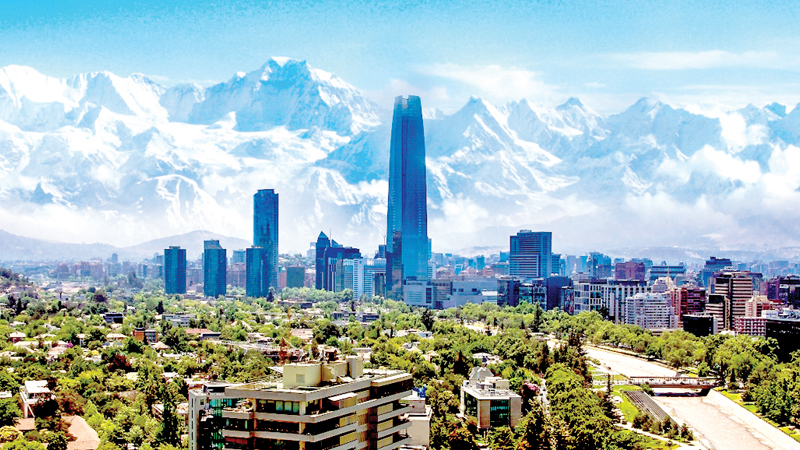An analysis by Prof. Priyanga Dunusinghe of the Department of Economics, University of Colombo
The Chilean economy is one of the most stable and prosperous economies in South America. Chile is a country full of natural resources. In the past, the country’s economy was largely based on the export of metals like silver. However, until the 1950s, Chile’s economy was largely based on the private sector.

Prof. Priyanga Dunusinghe
The nationalisation of major economic assets was initiated later. This nationalisation was done on the basis that the resources should be shared among all instead for the benefit of a few.
The US, China, Brazil, Argentina and South Korea are the main trading partners of Chile. With nationalisation, countries like the United States, stopped buying and importing metals from Chile. This nationalisation was even carried despite such consequences. However, in 1973, a military coup overthrew the socialist Government and established a dictatorship led by Pinochet.
In the 1970s, due to low global oil prices, Chile started borrowing with the money earned. Developed countries had the ability to get loans under very low interest rates. Therefore, most countries took these loans in the mid-1970s. By 1980, with the increase in loan interest rates, Chile had to face a debt repayment crisis without revenue growth for the State. There was a crisis of repayment without debt servicing. Inflation rose very rapidly. Inflation was 10 percent by 1980 and 27 percent by 1983. By the early 1990s, it had gone up to about 20 percent. Although this was not a hyperinflationary situation, it was a high inflationary situation.
With the credit crunch, Chile’s banking system collapsed. Although Chile’s Treasury and Central Bank intervened a lot to stop the banking sector from collapsing, some did completely. An agreement was signed with the International Monetary Fund (IMF). After doing so in 1982, although Chile made this agreement, other countries went into restructuring. The special feature of Chile is the changes made in relation to the time of payment. That is, by extending a loan that was to be paid in five years to ten years, the loan premium will decrease.
Accordingly, in 1983, 1985 and 1989, debt restructuring was carried out with IMF assistance. Chile did not actually enter into the Brady Bond scheme like other Latin American countries. That way they didn’t have to issue other debt bonds. Under the support of the US Treasury and the IMF, there was an increase in the maturity of the debt. With this crisis, an economic crisis was created in Chile. This economic crisis was such that the per capita income went down by 20 percent. However, by 1991, things were restored to normality. It was only in 1991 that Chile regained its per capita GDP. During the 1980s and 1990s, the Chilean economy suffered a major collapse. The 1980s-90s was a period in which Latin American countries regressed.
Debt restructuring
Chile has not gone through a single debt restructuring process in the past 30 years, following the 1983, 1985 and 1989 debt restructurings. There were several factors that led to this rise – a consensual agreement between main political parties regarding economic policy. Economic liberalisation continued in Chile. The crisis was understood regardless of party or opposition.
The Central Bank’s independence is important. With the Central Bank Independence Act, inflation control was made the Central Bank’s main concern and measures were taken to control inflation. As a result, inflation which was around 22 percent in 1991 came down to 3.5 percent by 2001 and less than five percent by 2021. While making the Central Bank independent, the Government started collecting taxes to reduce its budget gap.
Government spending was cut. By privatising enterprises owned by the Government, opportunities are created for the private sector to participate in the economy, and through the independence of the Central Bank, the system of Government borrowing through the Central Bank was completely abandoned. Through this, strict public financial discipline could be maintained.
Chile has been able to strengthen its domestic economy to promote foreign investment and maintain the rule of law. These independent institutions were given space to function and measures were taken to prevent fraud, corruption and wastage. In the early days there was bribery and corruption. It was possible to make Government institutions independent to stop them. With the independence of those institutions, they got the necessary powers and ability to prevent fraud, corruption and wastage.
Chile was able to reach an international trade agreement by prioritising export promotion. Chile worked to expand its agriculture-related goods and services sector. These steps were taken to promote economic management and prevent relapsing into bankruptcy. Historically, the country’s economy was based on mineral resources; but the private sector played a very limited role in the economy.
A situation that Chile has identified with this debt crisis is to give priority to enterprise development. Through that, the small and medium sector could be mustered and productivity can be increased. In that, they were always engaged in the promotion of the private sector and promotion of enterprises related to the private sector.
Five steps
These five steps were taken to stop Chile from facing a credit crisis again. Even now these theoretical decisions are handled very responsibly. Activities are maintained in such a way that foreign debt can be borne. It has been possible to maintain inflation in the single digits during the period 1990 to 2020. GDP per capita is around US$ 16,000, which is around four times that of Sri Lanka.
The first lesson that Sri Lanka can learn here is market economic liberalisation. Such a policy in this country has the consent of both main Opposition parties. According to their statements, they will not disrupt the IMF program. But it is evident that they are trying to change the conditions. It is very important to maintain the free economic policy. It seems that the main political parties are used to accepting market economic development as a basis. An important point here is that the open economy is accepted as being desirable. It should be accepted as a principle.
The economy should move towards liberalisation through continuous economic reforms. The Central Bank has become independent. However, the Government is unable to borrow as much as it needs to propel the economy forward.
The institutional system should be strengthened, especially for the process of managing income and expenditure.
It is very important to have an integrated structure where the Inland Revenue Department, Excise Department and Customs are not operated separately but collect combined revenue. A Revenue Authority was discussed in 2003, but it was not implemented. We should have a conversation about it again and deal with it.
Similarly, in Chile around 1980, the number of people escaping this tax net was limited. A mechanism has been developed regarding the percentage to be paid in respect of taxes. In that mechanism, the number of people who evade payment becomes limited. Sri Lanka should also strengthen its tax net.
Mechanism
If the mechanism is not strengthened, further tax will be paid by the taxpayers themselves. Therefore, measures should be taken in the future to get rid of this situation. The problem is how other tax proposals can be presented without going to a strong system of income tax collection.
Likewise, the Government should pay special attention to properly implement the rule of law to build some confidence for local and foreign investors. Chile realised that enterprise development is essential, to prevent a crisis from happening again.
Enterprise should be maintained in a way that it does not burden the economy and the Budget. The Government should open most sectors for private enterprise. Today, the Government interferes in almost all sectors, so doing business has become difficult for entrepreneurs.
Translated by Jonathan Frank









